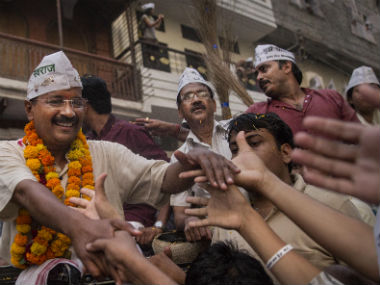By Ramesh Thomas Wally Olins, the legendary brand guru who recently left us, would say that great brands can come from anywhere, in all shapes and sizes. And one of the defining traits of legendary brands is their penchant for challenging the environment into which they were born. Classics like Ford, Elvis Presley, Volkswagen, and the reigning heartthrob Apple, all rewrote the rules of their businesses. Perhaps in less than a week, the world’s largest democracy would have announced its brand of choice to run their government. And the exercise of that choice was as intense a marketing battle as any. With large media budgets, hefty value propositions, sharp posturing, some desperate sales promotions, large scale competition bashing, and impending M&As, all make for a telling case study on how mindspace is won and lost. What sometimes gets lost in the din is the defining ways in which markets themselves undergo a dramatic change under such an onslaught. Not all for the bad though. [caption id=“attachment_1518725” align=“alignleft” width=“380”] Arvind Kejriwal greeting supporters in Varanasi in this file photo. Getty Images[/caption] Even our most cynical political commentators will admit that the great marketplace of Indian democracy experienced this change in no small measure in 2014. Undoubtedly, the dominating presence in this battle for the ballot was the 56-inch chested Modi. But was he the most definitive purveyor of change? I’m not sure he did anything different. He just plastered an ageing brand to the wall and then proceeded to pummel it into submission. And with good reason. It was a sitting duck. If anyone attempted to rewrite the rules of this great game it was Arvind Kejriwal, aged 45. (the AK 45 of this brand battle) A potential prime minister? Very doubtful. Are the bookies backing him to win a bunch of seats? No. Has he covered himself in glory? Nah. But think of a struggling Apple or the ridiculed Toyota in the 70s. Virgin was bullied and browbeaten in its formative years. But they all had one thing in common: they questioned the rules and stuck to their answers. And then with time, they forced the incumbents, big and small,l to rethink their strategies. Now every phone wants to look like an Apple when it grows up. Toyota is the only Asian brand in the top ten of the brand league table. And Virgin, well is Virgin. Love him or loath him, no political party or voter can ignore Kejriwal . He has a sharp point of view, often put very bluntly. He asks the most difficult questions about product delivery and after sales. And the competition is often in denial. The recent Delhi elections reminded me of some of the more famous last words in marketing history. My personal favourite is what Decca records said while rejecting the Beatles in 1962. “We don’t like their sound and guitar music is on its way out". In August of 1968, BusinessWeek predicted the demise of the Japanese auto industry in the US as a fading experiment. Dangerous to say such things. And when these iconoclasts insist on remaining in the market we call them wastrels, upstarts or even anarchists. So do upstarts and anarchist brands like AAP have a useful role in the evolution of markets? - They make us question what we are used to getting from incumbent players (opaque governance) - They remind us that nothing need be a pipe dream (Lok Pal bill) - They demonstrate that you can’t write off contrarian thinking( Delhi state elections) A cynic reminded me last night that the original AK45 didn’t go into production finally. Maybe it’s time to dust out the blueprints.
Love him or loath him, no political party or voter can ignore Kejriwal . He has a sharp point of view, often put very bluntly.
Advertisement
End of Article
Written by FP Archives
see more


)

)
)
)
)
)
)
)
)



